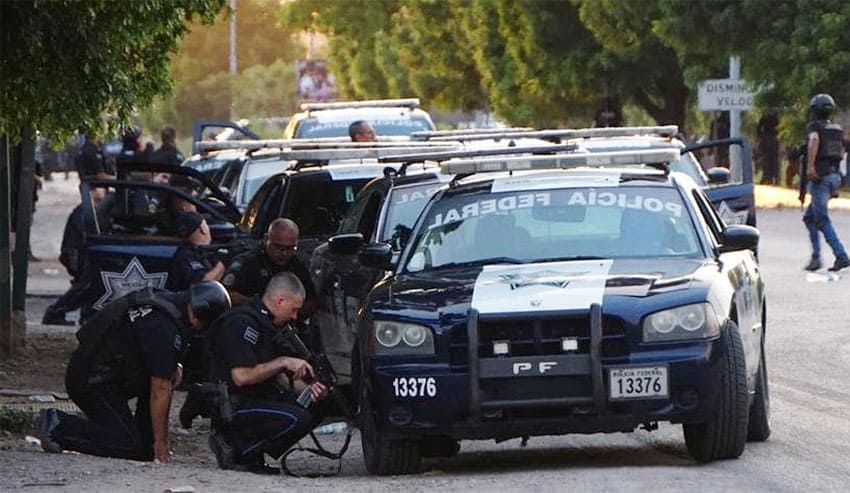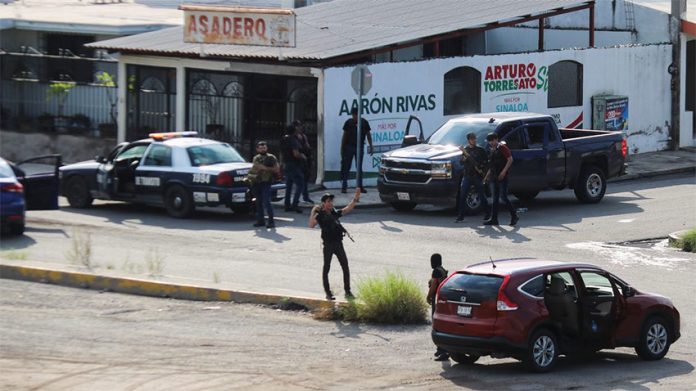President López Obrador continues to defend the decision to release one of Joaquín “El Chapo” Guzmán’s sons in Culiacán, Sinaloa, last Thursday during a targeted operation that the government admitted was poorly planned and hastily executed.
Speaking at an event in Oaxaca on Sunday, López Obrador said the decision to release Ovidio Guzmán López was “very difficult” but “very humane.”
“In the conflict in Culiacán, Sinaloa, we decided that the life of human beings comes first, not violence,” he said.
The arrest of Guzmán López, a Sinaloa Cartel leader wanted in the United States on drug trafficking charges, triggered a wave of attacks that terrorized residents of Culiacán and left eight people dead.
Acting on an order from the federal government’s security cabinet, security forces including the army and National Guard released Guzmán after they were outnumbered by armed criminals who surrounded the house in which he had been detained.
Security Secretary Alfonso Durazo said the decision to release the suspected narco was taken “to try to avoid more violence in the area and preserve the lives of our personnel and recover calm in the city.”
According to a report in The Wall Street Journal, another factor in the decision was that the Sinaloa Cartel detained at least six soldiers and sent a video of the apprehended troops to military commanders.
Another video sent to the military showed a soldier who had been tied up and executed with a bullet to the head. However, The Journal said it was unclear if the soldier had been detained during Thursday’s wave of violence.
López Obrador on Monday repeated the line that Guzmán was released to protect citizens’ lives.
“We couldn’t risk people’s lives for the arrest of an alleged criminal. We will never choose war, confrontation or the use of force, what we care about are people’s lives,” he said.
The president said it will ultimately be up to the people of Culiacán to judge whether the government did the right thing or not.

“I have a very calm conscience and I know that we acted correctly. We will continue to address the causes of violence . . .” López Obrador said.
On Sunday, he asserted that “peace and tranquility . . . brotherhood [and] love of thy neighbor” is the “philosophy, the doctrine of this government,” not “discord, hate [and] violence.”
“We don’t care that the conservatives, the authoritarians want us to govern in another way, they already did it and it didn’t yield results. To the contrary, they plunged Mexico into mourning, they turned Mexico into a cemetery with this idea of putting out fire with fire, [combating] violence with violence. Never again! We will never repress the people of Mexico,” López Obrador said.
“I want to thank the army . . . the soldiers . . . for the way in which they’re helping us not to use force . . . we can resolve problems through dialogue, through agreements . . .” he added.
“The ideal, the dream we have is that when everyone has work, when all Mexicans have wellbeing, when all the young people have been attended to, there will be peace and tranquility in our country, that’s our philosophy.”
In contrast to the president’s assertions, the release of the 28-year-old son of “El Chapo” shortly after he was arrested – and the Sinaloa Cartel’s takeover of Culiacán with an unprecedented show of strength – is widely considered to be a major embarrassment for the federal government.
National Defense Secretary Luis Cresencio Sandoval said on Friday that the security forces that participated in the operation “acted in a hasty manner” and failed to anticipate the ferocity of the Sinaloa Cartel’s response.
Security Secretary Durazo said Guzmán’s release was the result of a “failed operation” by security forces. He rejected any suggestion that the government had a “pact with criminals.”
Professor Raul Benítez, a security expert at the National Autonomous University, also described the operation as a failure, contending that it lacked both planning and coordination.
“It was a failure of everything,” he said. “What it showed was the great power and control that the Sinaloa Cartel still exercises over the city of Culiacán.”
The audacious show of strength repudiates the theory that the cartel is “bruised or broken” as a result of El Chapo’s arrest and imprisonment in the United States, Benítez said.
The academic contended that the aggressive security strategy of previous governments – the so-called war on drugs – was misguided but he didn’t endorse the López Obrador administration’s “softly, softly” approach either.
Other cartels will have learned an important lesson from Thursday’s events in Culiacán, Benítez said.
“The Gulf Cartel and the Jalisco cartel must be pleased. Now they know what to do when one of their leaders is lifted: bring out their biggest guns and sow chaos and anarchy.”
While many people believe that Thursday’s operation was botched, videos circulating on social media defended the performance of the security forces that participated.
“The army, navy, police and National Guard fulfilled their mission in Sinaloa,” says one video that has been shared by presumed members of the armed forces.
“They withstood gunfire for hours, provided protection to the civilian population, opened roads, removed blockades [and] resisted confrontations,” it continues.
“They have no reason to lower their heads. They do have a reason to . . . look people in the eyes and say that they fulfilled their duty.”
Source: El Universal (sp), Milenio (sp), Forbes (sp)
